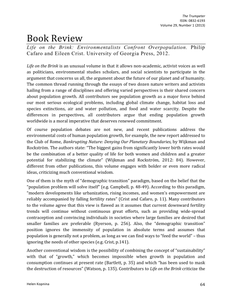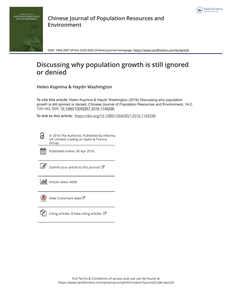There is increasing evidence that humans are not living sustainably. There are three major drivers of the unsustainable approach: population, consumption and the growth economy. There is widespread denial about these issues, but they clearly need to be addressed if we are to achieve any of the possible sustainable futures. The first and second versions of the ‘World Scientists Warning to Humanity’ both highlight the problem of increasing human population, as do the IPCC and IPBES reports. However, all have been largely ignored. The size of an ecologically sustainable global population is considered, taking into account the implications of increasing per capita consumption. The paper then discusses the reasons why society and academia largely ignore overpopulation. The claim that discussing overpopulation is ‘anti-human’ is refuted. Causal Layered Analysis is used to examine why society ignores data that do not fit with its myths and metaphors, and how such denial is leading society towards collapse. Non-coercive solutions are then considered to reach an ecologically-sustainable human population. LinkedIn: https://www.linkedin.com/in/helenkopnina/
MULTIFILE

Life on the Brink is an unusual volume in that it allows non-‐academic, activist voices as well as politicians, environmental studies scholars, and social scientists to participate in the argument that concerns us all, the argument about the future of our planet and of humanity. The common thread running through the essays of two dozen nature writers and activists hailing from a range of disciplines and offering varied perspectives is their shared concern about population growth. All contributors see population growth as a major force behind our most serious ecological problems, including global climate change, habitat loss and species extinctions, air and water pollution, and food and water scarcity. Despite the differences in perspectives, all contributors argue that ending population growth worldwide is a moral imperative that deserves renewed commitment. https://www.linkedin.com/in/helenkopnina/
DOCUMENT

Due to a number of factors outlined in this article, the issue of population growth is excluded from the sustainability discussion. In this article, we explore some of the ethical presumptions that underlie the issues linking population growth and sustainability. Critics argue that action to address population creates social and economic segregation, and portray overpopulation concerns as being “anti-poor,” “anti-developing country,” or even “antihuman.” Yet, de-linking demographic factors from sustainability concerns ignores significant global realities and trends, such as the ecological limits of the Earth, the welfare and long-term livelihood of the most vulnerable groups, future prospects of humanity, as well as the ecosystems that support society. https://doi.org/10.1080/10042857.2016.1149296 LinkedIn: https://www.linkedin.com/in/helenkopnina/
MULTIFILE
